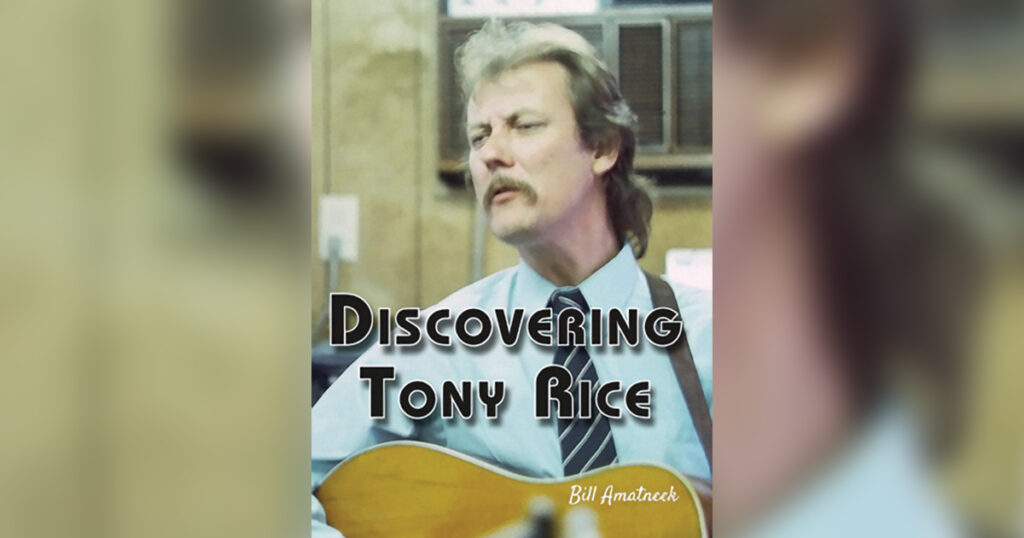Discovering Tony Rice
Like Bill Monroe and Earl Scruggs, Tony Rice left such an indelible imprint on bluegrass music and his chosen instrument that scholars and bluegrass fans will be seeking out biographic information and anecdotes about the man and the music he created for decades to come. Leveraging his longtime personal and professional association with Rice here, former David Grisman Quintet bassist and Rice bandmate Bill Amatneek takes the reader through an extended reflection on the life and hard, even ugly, times of David Anthony Rice.
It’s not always a pretty story. And much like Can’t You Hear Me Callin’?, Richard K. Smith’s seminal biography of Big Mon, Discovering Tony Rice has already stirred up considerable animosity and controversy with some of the material reported here and the implications and interpretations the author makes. Indeed, one highly prominent, respected Tony Rice fan page on Facebook refused to even mention the book because “Tony’s not here to defend himself” from what that site’s owner feels are unfounded charges by the author.
Of course, everyone will have different opinions. To develop this biography, Amatneek not only called upon his own reflections and experiences, he interviewed many of Rice’s closest musical and personal associates, including Béla Fleck, Sam Bush, Jerry Douglas, luthier-to-the-stars Harry Sparks and Tony’s uncle Frank Poindexter. That effort has produced a richly veined, deeply engrossing look into Tony’s often very-troubled soul.
But with so many of Rice’s other closest associates offering extending interviews, one mystery is why the musician closest to him personally and musically—David Grisman—wasn’t interviewed here. Maybe it was just too personal for Dawg, or perhaps Grisman is saving that material for his own biography (which one avidly hopes is in the works). To be sure, the author reports on the Grisman Quintet days and the legacy of “Tee” and Dawg as the “Gasoline Brothers.” But it’s disturbing there’s nothing here directly from Grisman, nor from his other musical soulmate, J.D. Crowe, who passed a year after Tony.
For those of us who adored his playing and singing, admired his stellar stage cool and musical intensity as fans, Discovering Tony Rice delves into some deep, dark corners, like his strange obsession with John Wilkes Booth. We mourned deeply as his skills deserted him, and cried on Christmas Day when we heard the terrible news that Tony Rice had been found alone in his kitchen following an abrupt death. Substance abuse, personal and financial demons, divorce and depressions, the catastrophic health consequences that left him first unable to sing in his unmistakable style, then losing his ability to play guitar up to his standards, his ultimate retreat into his basement lair surrounded by vintage watchmaking gear and classic jazz LPs, all contributed to his untimely demise, Amatneek diligently reports.
Watching any great artist deteriorate and fade hurts, but seeing someone who was such a cornerstone of modern bluegrass end so sadly bears heavily on us all. But Amatneek also reports on the happier times, his success as an artist and growth as a musician. Of course, the story of how Rice’s treasured Martin D-28 that Clarence White once owned was recovered from a catastrophic flood and restored to playability is recounted here in some detail, too.
Discovering Tony Rice adds an essential new volume to the work done earlier by Tim Stafford and Caroline Wright in Still Inside: The Tony Rice Story. Amatneek, who must have been divided over how much to reveal, what rumors to quash or support, and how much of Rice’s all-too human foibles to report here, to me finds a balance. It shows us just what went into the brilliance of the man’s musical legacy, his painful withdrawal from friends and the music scene, and the toll his pursuit of the ultimate musical goal cost him. It’s instantly essential reading for Tony Rice fans, and a worthwhile book for less fanatical devotees. But anyone expecting hagiography here will be in for a shock or two, so be prepared.
Share this article
2 Comments
Leave a Comment Cancel Reply
This site uses Akismet to reduce spam. Learn how your comment data is processed.


I look forward to reading the book simply because it is about Tony. Tony and I were related by marriage, my sister-in-law being his aunt. I knew him all his entire life and would have admire him if I hadn’t known him at all. Knowing how emaciated he looked, I thought about stopping by, but I knew he was reclusive. I lived only a couple miles from him and when I got the news of his death I couldn’t have been sadder.
What did Tony Rice actually die from. TIA